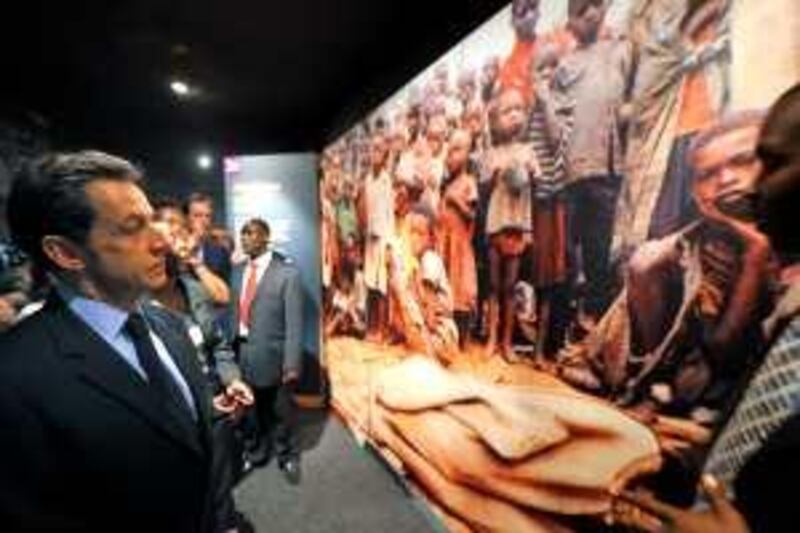Of the major outside players in the 1994 Rwandan genocide, France perhaps has the most to be sorry for. The French were the most powerful foreign ally of the regime that carried out the bloodbath, yet instead of disabusing extremist ethnic Hutus of their fears about minority ethnic Tutsis, it reinforced them. More troubling still, agents with at least unofficial links to France funnelled arms to some perpetrators of the massacres, even while they were underway. Finally, in the verdict of the late Rwanda expert Alison des Forges: "The French were in a position to save Tutsis and others at risk with relatively little difficulty and yet they chose to save very few."
So it means something that President Nicolas Sarkozy, in the first trip to Rwanda by a French political leader in a quarter of a century, admitted last week that "serious errors of judgment had been made" by Paris. As public mea culpas go, Mr Sarkozy's acknowledgement last week was belated; the former UN secretary-general Kofi Annan, and ex-presidents Bill Clinton of the US and Thabo Mbeki of South Africa, beat Elysée Palace to the confessional long ago.
The French president's acceptance of responsibility was grudging, too. He said both France and the ever popular - and conveniently amorphous - "international community" were at fault for the genocide, a spin that obfuscated France's uniquely important role in it. Mr Sarkozy did not, strictly speaking, even apologise. Pressed by French reporters to utter a "sorry" on behalf of his nation, he pointedly refused. Even so, the demi-mea culpa was significant, if only for the act of penance that quickly followed.
On Tuesday, French authorities arrested "Lady Genocide" - Agathe Habyarimana, the widow of the former Rwandan president whose assassination triggered the bloodbath, in which up to a million Tutsis and politically moderate Hutus were killed in 100 days. It was the fastest mass slaughter in modern times. Mrs Habyarimana, 67, was taken from her home south of Paris by officials acting on a Rwandan arrest warrant. Now under house arrest, the former first lady is expected to appear before a Paris court within 10 days to hear whether she will be extradited to the Rwandan capital Kigali or potentially face trial in France.
For Mrs Habyarimana, a return to Kigali for trial could mean death by firing squad. Also possible is a trial at the Tanzania-based UN International Criminal Tribunal for Rwanda, which has no death penalty. Wherever she ends up, Mrs Habyarimana has much to answer for. Since the French airlifted her and an entourage of hard-line Hutus out of Kigali in the genocide's opening hours, she has cast herself as grieving widow. Rwandans know otherwise.
In pre-genocide Rwanda, power resided not in Mrs Habyarimana's husband, the president, but in a cabal of extremist Hutus, in which she and her three brothers were central figures. She is alleged to have been at the heart of a death squad known as "Network Zero", which has been accused of plotting the murder of her husband and the genocide in order to prevent implementation of a power-sharing agreement with minority ethnic Tutsis.
So fearsome was the reputation of Mrs Habyarimana and "le Clan de Madame" among Rwandans that they nicknamed her after the murderous mother of a 19th-century Rwandan king. What Rwandans and the courts want most to question Mrs Habyarimana about is her whereabouts and reactions at 8.30 on the evening of April 6, 1994, when the executive jet carrying her husband was blown out of the sky as it approached Kigali.
Mrs Habyarimana could not have failed to hear the explosion; everyone in the Rwandan capital heard it. Within minutes, they knew the president was dead, and within an hour, the lists of those top officials to die were distributed. Was she shocked? Or had she acquiesced, even blessed, a plot to kill her husband? Answers to these questions might shed light on one of the 20th century's biggest mysteries: who fired the two missiles that brought down the jet and set off the genocide.
For all of Mr Sarkozy's talk last week about turning over a new leaf in central Africa, one thread has proved remarkably durable: France's fear of "Anglo Saxon" plots aimed at undermining its influence in Africa. This fear, embodied in the Tutsi-led rebel army that challenged the Habyarimana government, explains how France found itself supporting a dictatorship at whose heart was le Clan de Madame, without even asking for political reform as a price for its support, the political scientist Gerard Prunier says.
This "blind commitment' helped produce the genocide, he says. Jump ahead 16 years. In reaching out to the enemy of its former ally and allowing Mrs Habyarimana's arrest, Mr Sarkozy was not suddenly stricken by pangs of conscience. Concerns about Anglo Saxon influence, if not plots, were again critical. France's traditional sphere of influence in Africa has given way recently to Anglophone inroads. To the chagrin of Paris, Kigali last year had the gall to join the Commonwealth, a group made up almost entirely of former British colonies. The language of instruction in Rwandan schools already had been switched from French to English.
The embarrassment of a demi-mea culpa and continuing to harbour Mrs Habyarimana was, it seems, no longer worth the price of a Francophone Africa's further erosion. @Email:cnelson@thenational.ae





